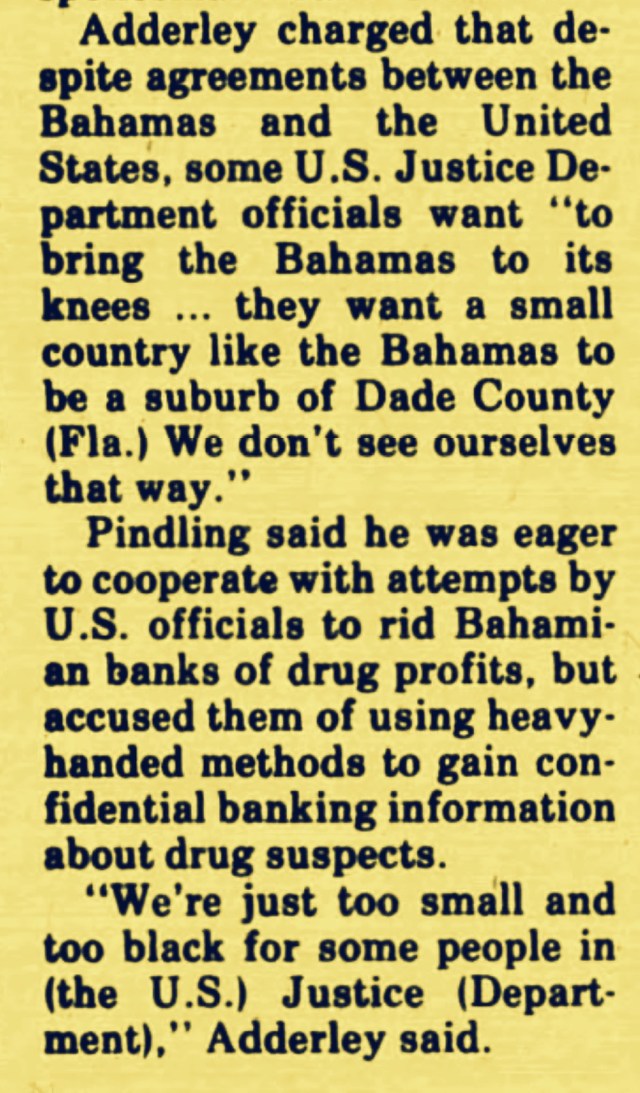
The drug years ostensibly began in the late 1970s. Drug trafficking started with marijuana smuggled out of South America headed to the United States. Things progressed quickly to the more profitable, more easily transportable, cocaine. By 1978, the Bahamas was reported as being a major international route for cocaine trafficking. By August 1979, Bahamian police had seized an estimated 169 tons of cocaine with a street value of $337 million dollars.
Just five short years after celebrating its inaugural national independence in 1973, few realised, at the time, what a devastating toll drug trafficking would come to take on the Bahamas.
An immeasurable cost would be had, not just in that first violent and monied decade, but for a generation to come. What had not been foreseen was a profound psycho-social tax, imposed on the very soul of the nation, just at a crucial moment in its history when the country needed solidarity of purpose, instead of broken dreams.

(The Charlotte Observer, Sunday, September 30, 1984)
Public confidence would be eroded.
Reputations would be left in tatters.
Bahamian heroes, the first of their kind, who flew high in the imagination of this young nation, would be pulled, unceremoniously, and to many, irretrievably, back down to earth.


By September 5th., 1983, on the very day the now infamous NBC Brian Ross exposè on Bahamian political figures being linked to drug money, aired across the United States, through affiliates in Canada and in the Bahamas, the tiny island nation was prospering, yet suffering like never before.
A torrent of drugs and drug money flowed, seemingly unabated, and according to Brian Ross and NBC, was being aided by powerful individuals within the Bahamian government, police and customs.
Drug money carved newly hewn rivers of riches. They ran across desert dry economic sands of every island, watering, the Bahamas as if its liquid were gold. Private jets were landing hour upon hour, shiny new cars with 17 year-old thousandaires drove wildly over potholed roads, new built condominiums were rising up everywhere, mansion houses became vogue, banks were bursting at the seams with American dollars and businesses across the islands were prospering.
Undoubtedly, like the money years of civil war blockading, prohibition rum running, casino gambling and land selling tourism; the Colombian drug years were an economic boom for the Bahamas. Nonetheless, as new money flowed, the consequent murder rate, jail terms, and those struck down irreparably by drug induced psychosis, continued to rise.
Another cost to the nation couldn’t be felt then. It would be though, later on.



(Tyler Morning Telegraph, Thursday, 15 September 1983)
1984 – THE LEADER NEEDS A LAWYER. PINDLING FIGHTS FOR HIS REPUTATION AND POLITICAL LIFE BY HIRING TOP U.S. LAWYER F. Lee Bailey AND CONVENING A NEW COMMISSION OF INQUIRY
Among the casualties of the drug era was the larger than life hero reputation and goodwill of the man credited with having been a type of Moses personae, an anointed leader, who led his people into a new political era.
Prime Minister Lynden Pindling, hero of the Bahamian civil rights movement, which culminated in the first majority rule political victory in 1967, became the object of intense international speculation and criminal suspicion.





(Alabama Journal, Monday, 16 July 1984)
PRIME MINISTER LYNDEN PINDLING CLEARED BY COMMISSION OF INQUIRY INVESTIGATING OF DRUG RELATED BRIBES
COMMISSION’S REPORT HOWEVER REVEALED A POLITICALLY COMPROMISED LEADER


(The Philadelphia Inquirer, Tuesday, 18 December 1984)
THE PRIME MINISTER’S FINANCES – 1st January 1977 to 31st DECEMBER 1983
Personal financial statements and bank records for Prime Minister Lynden Pindling were submitted to the Commission of Inquiry. While they reveal no direct bribes or payments by drug dealers, the amounts deposited far exceeded Pindling’s salary as Prime Minister.



Courtesy of book: An Economic History of the BAHAMAS 2nd Ed., (2008) Anthony Audley Thompson LLB. Commercial Services Group, Nassau, Bahamas
23,000 pages of testimony and some 500 witnesses later… PINDLING EXONERATED BY THE COMMISSION OF INQUIRY DECIDES TO SUE American NBC NEWS and 16 CANADIAN AFFILIATE STATIONS IN A $4 million DEFAMATION SUIT FILED IN CANADA
JULY 1989 – PINDLING EXPECTED IN TORONTO TO BE DEPOSED BY NBC LAWYERS AHEAD OF TRIAL
Sordid details of Pindling’s money dealings, questionable friends and shadowy associates had begun to hack away at the hero persona, imbued in the Lynden Pindling, which led the Bahamas to that famous 10th January 1967 political first.
No one who was of age to vote in 1967 could have ever predicted that 22 years later, their leader, their hero, would be embroiled in a defamation lawsuit, in Canada, over alleged drug money connections.
This and many other things, we can only surmise, may have occurred to Prime Minister Lynden Pindling as he made preparations to face NBC’s team of lawyer in Toronto, Canada.
It may be reasons of history and a future legacy, whatever he had envisioned it be, that aided Pindling’s decision to drop the defamation lawsuit.




(The Windsor Star, Monday, 10 July 1989)
OCTOBER 1989 – PRIME MINISTER OF THE BAHAMAS DROPS CANADIAN LAWSUIT AGAINST NBC AND BOWS OUT OF TODAY SHOW INTERVIEW AFTER BREACH OF CONFIDENTIALITY AGREEMENT BY NBC






